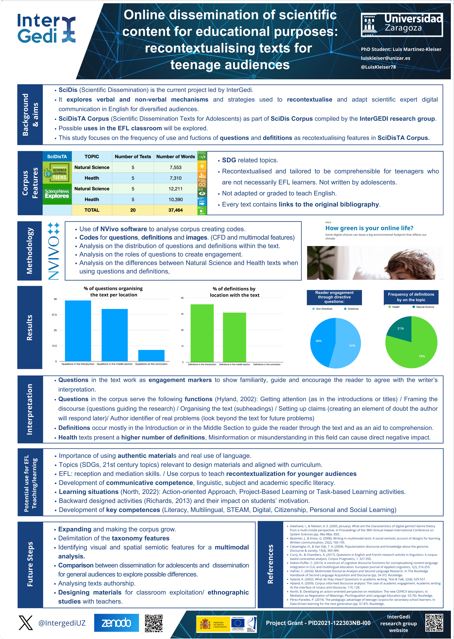IVACS2024: Luis Martínez-Kleiser presents a poster on recontextualisation features in blogs for adolescents
Luis Martínez-Kleiser participated in the 11th Inter-Varietal Applied Corpus Studies (IVACS) conference, which was celebrated in the University of Cambridge on the 16th and 17th of July.
Luis presented a poster titled “Online dissemination of scientific content for educational purposes: recontextualising texts for teenage audiences”. In it, he presented a study of discursive strategies in texts from the Science Journal for Teens blog. With the aim of identifying patterns that recontextualise scientific knowledge for adolescents, he carried out an analysis with NVivo of 10 texts from this blog, focusing on the use of questions and definitions. Results show that questions are mainly used as engagement markers, and definitions as a comprehension aid. Luis also linked his findings with implications and potential use in the English as a Foreign Language classroom.

You can read Luis’ abstract below:
Online dissemination of scientific content for educational purposes: recontextualising texts for teenage audiences
Democratization of knowledge seeks to render complex concepts available to a broader audience, empowering individuals to create a personal vision of the world and to construct informed opinions. Due to the spread of digital media, there are young adults who enjoy swift access to scientific information which requires recontextualization for effective communication. The existence of blogs or websites disseminating scientific knowledge adapted and made comprehensible for teenagers is a fact. It is the goal of this study to curate a corpus of digital scientific publications designed for young learners, probing into the verbal and non-verbal strategies employed.
To dissect the features and how scientific-specialized language is recast and constructed for adolescents, a small-scale corpus of 10 texts published between 2020 and 2023 on the site Science Journal for Teens has been selected. These samples target 12 to 18-year-old English native speakers in Middle School and High School and endeavour to make science research-based concepts accessible to such ages. The topics span from pollution, possible uses of waste and recycling, climate change impact, environmental laws, ecological farming or global warming to mental and physical healthy habits.
The investigation encompasses discursive strategies such as paraphrasing, elaboration, and condensation of information. Given the prevalence of multimodal communication in the digital landscape, attention will be directed toward the analysis of the orchestration of modes, especially the verbal and visual ones, looking into layout, colour selection, and the integration of images and graphics. The ultimate aim is to identify patterns that facilitate the transformation of intricate findings intended for expert audiences into digestible concepts for young minds. Recontextualizing scientific texts for teenage audiences extends beyond enhancing comprehension; it involves the development of persuasive linguistic and multimodal strategies to captivate young readers on pertinent topics. Authors strive for this engagement while upholding knowledge legitimacy and credibility.
The diversity of modes employed to bring technical knowledge closer to young audiences and the way they impact understanding by such readers will be discussed together with the potential use of these texts in English as a Foreign Language Secondary Education setting, aiming to facilitate the dissemination of scientific content for educational purposes.
